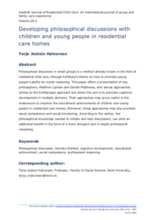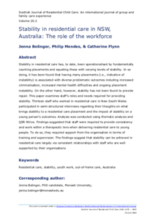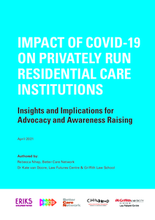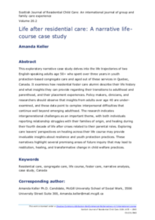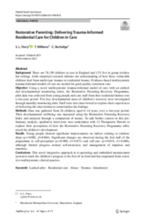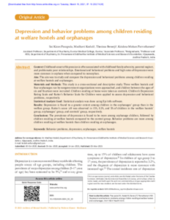Displaying 141 - 150 of 1510
Since the 1980s, an increasing number of researchers have focused on the educational attainment of looked-after children. Children in residential homes are in high risk of educational failure, and such failure may cause social problems later in life. Several scholars have called for efforts to promote lookedafter children’s ability to cope with academic challenges.
Stability in residential care has, to date, been operationalised by fundamentally counting placements and equating these with varying levels of stability. In so doing, it has been found that having many placements (i.e., indicative of instability) is associated with diverse problematic outcomes including increased criminalisation, increased mental health difficulties and ongoing placement instability. On the other hand, however, stability has not been found to provide repair. This paper examines staff’s roles and needs required for providing stability.
With millions of children worldwide living in alternative care settings, this article applies the learning from implementation science to advance the sector’s thinking around what needs to be in place to ensure consistently high-quality residential care.
This study explores the effect of COVID-19 on a small number of privately run and funded residential care institutions by conducting a qualitative research study comprising 21 semi-structured interviews across seven focus countries.
This exploratory narrative case study delves into the life trajectories of two English-speaking adults age 50+ who spent over three years in youth protection-based congregate care and aged out of these services in Quebec, Canada.
Using a novel multisystemic trauma-informed model of care with an embedded developmental monitoring index, the Restorative Parenting Recovery Programme, pilot data was collected from young people and care staff from four residential homes over a two-year period.
The authors of this study investigated the prevalence rates of childhood trauma, depressive symptoms, anxiety symptoms and suicidal behaviors among Vietnamese adolescents and compared the differences between institutionalized adolescents (IAs) and noninstitutionalized adolescents (NIAs). In addition, they examined the multidimensional associations between childhood trauma and psychopathology among IAs.
This article exploresthe extent to which general strain theory (GST) and self-control theory can explain the mental health outcomes of youth in-care.
The aim of this article was to study and compare the depression and behavioral problems among children residing at welfare hostels and orphanages.
This grounded theory study aimed to theorize pathways through which orphaned adolescents within institutional care navigate to achieve positive adaptation.

